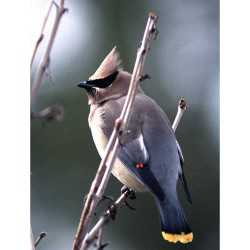Berry Growers Battling Birds

“It was Old Testament bad.” That’s how Bill Braswell describes the bird plague in blueberries this past season. Serving as president of the Florida Blueberry Growers Association, he heard from growers all over the state that this was the worst ever when it comes to birds attacking fruit.
“I had several growers call me to come out and look at their farms,” he says. “You know how people can tend to exaggerate how bad things like this are, so I wasn’t expecting to see what I did. A few of the farms I visited, it was almost creepy how bad the birds were. They were coming out of the trees and swirling in a vortex down into the blueberries. It was bizarre.”
Braswell says he’s been asked countless times how bad the crop losses were due to the bird attacks. He says there is no way to know, but some growers who had really bad problems figure they lost 25% of their crop to the winged bandits.
Bad Timing
So what was it about this season that made the bird problem so bad for blueberry growers? Braswell says it is most likely timing.
“I believe the birds tend to pass through at about the same time ever year, but the fruit doesn’t ripen at the same time every year,” he says. “This year, there was a lot of ripe fruit on the plants when the birds came in. I know these are migratory birds to some extent, but they will not leave a food source until it’s gone. They hung around from about the second week of the season until the end this year.”
Scare Tactics
There are a number of different methods to deter birds from attacking blueberry crops. Braswell says most work to a degree; but over time, the birds can get used to them. “These different tools can work for four or five days before the birds get accustomed to it,” he says. “So, you might introduce one tactic like the squawkers or bird bangers, then after four or five days move to another tactic. It helps keep them at bay.”
Cannons are probably the most common tool used in blueberry fields to scare birds. However, they come with the challenge of complaints from neighbors who take issue with the sound of cannons going off nearby. With the intensity of bird pressure this season, the complaints about noise rose accordingly.
“The thing with cannons is to keep the birds jostling around and never allowing them to settle down in the bushes,” says Braswell. “Some people tend to overuse them. Conventional wisdom is once every three minutes is plenty, so you don’t need to be blowing them off every five seconds.”
Nets provide an effective barrier to birds, but are expensive and one tropical storm or hurricane can blow the investment away. “Since the 2004 hurricanes blew through, most people don’t see the nets as very practical on a large scale,” says Braswell.
Late in the season, a chemical repellent was approved by EPA for use in blueberries. The product is called Avian Control (methyl anthranilate, Avian Enterprises).
Braswell says that growers he talked to who had used the product felt they got some benefit, but it is the type of situation where the repellent needs to be applied before the birds get established in the fields.
No Perch To Peck From
Perhaps one of the most effective means of keeping birds out of blueberries is planting fields away from trees where they can seek security.
“In my observation, about a third of the birds in a flock fly in and go to the ground to eat fallen berries,” says Braswell. “Another third go to the top of the plants to act as look-outs and the final third go into the middle of the plants to pick off ripe fruit.
“Then something will happen that startles the birds and they fly off into a nearby tree for security. If they don’t have a tree to hide in, they don’t have the security and tend to leave those fields alone. Clear Springs is a great example where we have about 400 acres of blueberries and didn’t have a problem with birds. I believe the reason for this is there are no trees within a short flight [several hundred yards] of the berries.”










